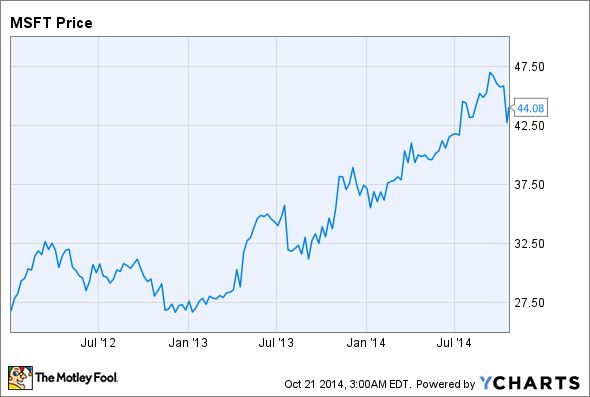The stock market currently values software giant Microsoft (MSFT 0.37%) at roughly $370 billion, or about $44 per share. This is the price of a share of Microsoft, and it's risen significantly over the past three years.
But the price of a stock and the value of a stock are two completely different things. The price is simply the price at which the last transaction in Microsoft stock took place, while the value depends on the earnings power and future prospects of the company. To quote Warren Buffett, "Price is what you pay. Value is what you get."
What's a share of Microsoft stock really worth, then? Let's find out.
A look at the business
A discussion of how much a stock is worth should always start with a detailed look at the business itself. Microsoft is split into two main segments, Devices & Consumer and Commercial, the result of a reorganization carried out last year. Here's a look at revenue and gross profit derived from each component of these segments during fiscal year 2014, which ended in June:
|
Segment |
Revenue (Billions USD) |
% of Total |
Gross Profit (Billions USD) |
% of Total |
|---|---|---|---|---|
|
Commercial Licensing |
$42.03 |
48.4% |
$38.60 |
64.4% |
|
Commercial Other |
$7.55 |
8.7% |
$1.86 |
3.1% |
|
Total Commercial |
$49.58 |
57.1% |
$40.46 |
67.5% |
|
Devices & Consumer Licensing |
$18.80 |
21.7% |
$17.22 |
28.7% |
|
Computing & Gaming Hardware |
$9.63 |
11.1% |
$0.89 |
1.5% |
|
Phone Hardware |
$1.99 |
2.3% |
$0.05 |
0.1% |
|
Devices & Consumer Other |
$7.26 |
8.4% |
$1.77 |
3% |
|
Total Devices & Consumer |
$37.68 |
43.4% |
$19.93 |
33.3% |
|
Corporate & Other |
($0.42) |
(0.5%) |
($0.49) |
(0.8%) |
|
Total Microsoft |
$86.83 |
100% |
$59.90 |
100% |
Source: Microsoft
A few important insights can be garnered from this data. First, the commercial side of the business is larger and far more profitable than the consumer side. Selling software licenses to enterprise customers is by far the largest component of Microsoft's gross profit, and the good news for the company is that this part of the business has been growing. In fiscal year 2014, commercial licensing revenue grew by about 6%, with gross profit growing by 6.5%. Microsoft is, by far, the largest software vendor in the world, and it's no surprise that this is the strongest part of the company's business.
The consumer side of Microsoft tells a different story. Software licensing makes up the bulk of revenue and gross profit, but this part of the business actually declined in 2014, down about 1%. This is partially because the subscription version of Microsoft Office, the company's ubiquitous productivity suite, is part of the "Devices & Consumer Other" segment, but the gross profit derived from those two segments combined still declined by about 0.5% in 2014. That's a far cry from the mid-single digit growth on the commercial side of the business.
Microsoft's other Devices & Consumer businesses contribute little to the bottom line, and they're a testament to the difficulty that the company has had translating its dominance in the enterprise software market into success selling devices. Microsoft's phone segment, created after the acquisition of Nokia's phone operations, is currently a drag on the company's earnings, and hardware like the Surface tablet and the Xbox One have had moderate success at best.

Image source: Getty Images.
How much is Microsoft worth?
There are three key things that matter when estimating the value of a company:
- How much profit the company earns today.
- How fast earnings will grow in the future.
- Any excess cash on the balance sheet.
In fiscal year 2014, Microsoft recorded a net income of about $22 billion, or $2.63 per share. On the balance sheet, the company has $63 billion in net cash, equivalent to $7.50 per share. The value of Microsoft is this excess cash, plus earnings times some multiple, which depends on the reliability and rate of growth of earnings in the future.
The average P/E ratio of the S&P 500 has historically been around 15, and if we apply this multiple to Microsoft's earnings, adding in the net cash, we arrive at a fair value of about $47 per share. That's a bit higher than where Microsoft trades today.
What multiple does Microsoft deserve? Given Microsoft's dominant position in the enterprise software industry, and the fact that the company is managing to consistently grow that business, a P/E ratio of 15 seems perfectly reasonable. Mid-single digit annual earnings going forward should be achievable, and analysts are expecting about 7% annual earnings growth over the next five years.
Valuing stocks is a very rough process, and there's no real "right" answer. Different interpretations of future growth prospects could lead to radically different results, but being able to come up with a conservative estimate based on realistic assumptions is an important skill to have. Is Microsoft worth $100 per share today? Probably not, since it would require growth well beyond what seems plausible. Is Microsoft worth $20 per share today? Also probably not, since cash would cover nearly half of this and Microsoft has serious competitive advantages in the enterprise software industry.
Foolish thoughts
It's easy to fall into the trap of being either overly optimistic or overly pessimistic on a particular stock. Microsoft has a strong business that continues to grow, but single-digit earnings growth is likely to be the best investors can hope for. A P/E ratio of 15, adjusted for net cash, puts Microsoft's fair value at about $47 per share, a bit higher than where it trades today. Microsoft is certainly not the bargain that it was a few years ago, but it's still a very solid company trading at a fair price.





